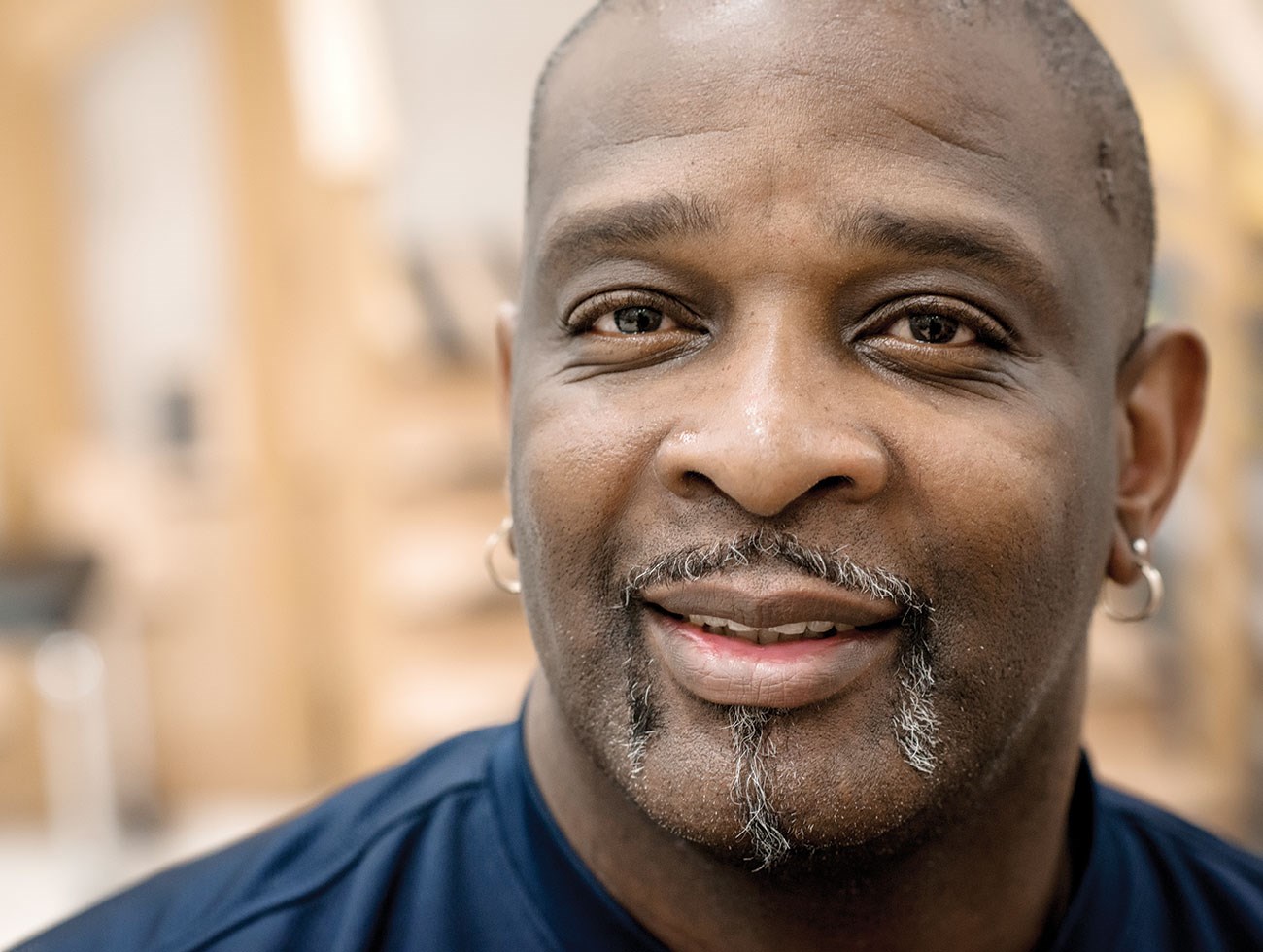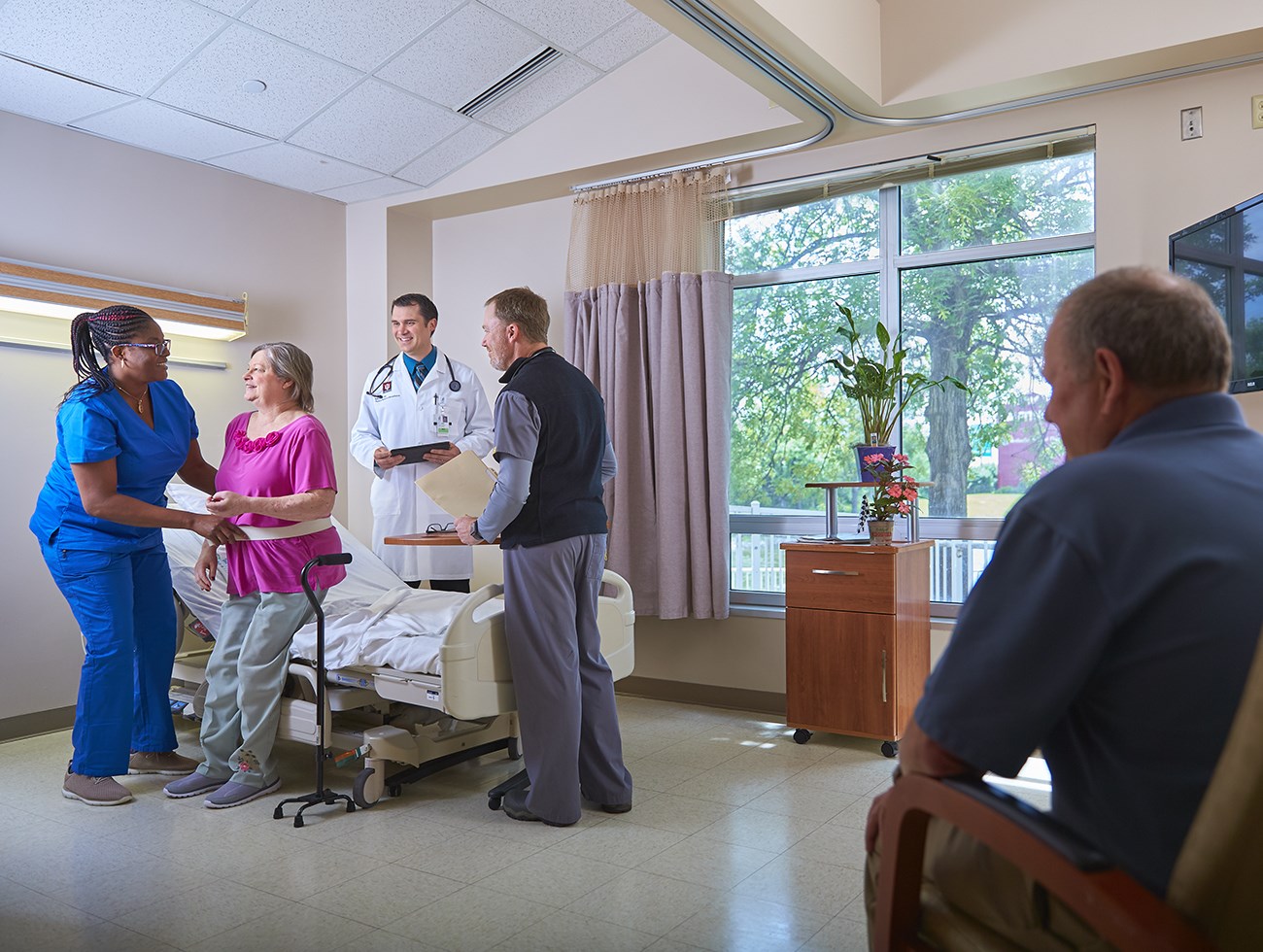
What to Expect as an Inpatient
Your Stay after a Transplant
The average length of stay on the Transplant Rehabilitation Unit at Rehabilitation Hospital of Indiana (RHI) is 15 days, but your length of stay as an inpatient will be determined by your specific needs. Note that approximately 70% of patients are discharged to the community after their inpatient stay.
Upon admission, you will receive a transition binder, which will include information pertinent to your rehabilitation program. This binder is meant to serve as a central location for patients and caregivers to keep important material throughout the continuum of care, as additional information and resource materials specific to your brain injury and recovery will be added to the binder periodically.
 Patients learn to become as independent as possible, with education and training based on the individual’s needs.
Patients learn to become as independent as possible, with education and training based on the individual’s needs.
Working Toward Your Goals from Day 1
The first two days of your stay are very important for setting goals and getting into a routine. It's highly recommended that your family and/or caregivers are present for the first two days.
Day 1
Your admission day at RHI will be light to allow you to transition and get settled.
- The nurse will greet you when you arrive
- The nurse will do a head-to-toe assessment and ask you questions about your health
- A visit with your rehabilitation doctor is possible, depending on what day you arrive
- Family or caregivers should be with you to help answer questions and get you settled in
Day 2
- Comprehensive evaluations by the treatment team
- Meet your care coordinator
- Meet with Physical Therapy, Occupational Therapy, and Speech-Language Pathology who will each assess abilities and help set goals
- Meet with a clinical dietician
- Meet with a wound care specialist (if needed)
- Talk with your rehabilitation doctor (if not done on day one)
Within the First Week
- You will meet your ongoing therapists, who have specific training and experience with therapeutic interventions for patients at all levels of injury, the care coordinator, neuropsychology team, and dietary (as needed)
- The team will meet to discuss your treatment plan and goals and will develop a tentative discharge date
 Dr. Littell and staff members assisting patient with transfers
Dr. Littell and staff members assisting patient with transfers
Sample Daily Routine and Expectations
Patients receive a minimum of three hours of individual one-to-one therapy, five days per week (15 hours a week). Time not spent in therapies can be used to rest and visit.
6:00 - 8:30 am*: Wake up, get dressed, and eat breakfast
8:30 am -12:00 pm: Morning therapy sessions
12:00 - 1:00 pm: Lunch (in common area) and rest
1:00 - 5:00 pm: Afternoon therapy sessions
5:00 - 6:00 pm: Dinner (in common area)
6:00 - 9:00 pm: Relax and get ready for bed
*Occupational Therapy or Speech Therapy may work with you before or during breakfast, depending on your specific therapy needs
Post-op Expectations
Rehabilitation will focus on proximal muscle strengthening with precautions. Discharge goals include: maximizing independent mobility, ensuring safety and independence in self-care, management of energy conservation strategies, as well as an understanding of necessary precautions.
Working with an Interdisciplinary Team
During your stay as a transplant rehabilitation patient, you will receive care from a specialized transplant interdisciplinary team including a physical medicine and rehabilitation (physiatrist) physician, physical therapist, occupational therapist, speech therapist, rehabilitation trained nurses and, when needed, pulmonologist, respiratory therapists, psychiatrist, and neuropsychologist.
What Else to Expect on the Transplant Rehabilitation Unit
Our goal is for patients in our transplant rehabilitation program to regain as much independence as possible. Our facility is familiar with all types of transplants and has a program designed to support patients and families on the road to recovery.
- Caregivers and families are encouraged to be fully involved in the recovery and therapy process. Research indicates that patients make more progress when caregivers are involved. Caregiver/family involvement from day one is key to patient success, so they should plan to:
- schedule time to attend therapy sessions
- come to therapy ready to learn and willing to participate
- understand that some tasks may pose challenges for both caregiver and their loved one
- encourage their loved one to act as independently as possible
- be prepared to do an overnight stay closer to discharge to get hands-on practice and ensure a smooth transition home
- While working toward independence, patient safety is the highest priority. Therefore, patients will be asked to wait for staff members to assist them with daily activities, including self-care, transfers, and toileting. Caregivers may assist their loved one once training with therapy has been completed.
- Patient progress and goals will be evaluated on a weekly basis to ensure the provision of appropriate treatments, training, and care at the patient’s current functional level.
- Patients learn to become as independent as possible, with education and training based on the individual’s needs.
- We encourage family to participate in therapy sessions if it is not a distraction to the patient. If appropriate, caregivers can participate in family training.
- A tentative discharge date will be set at your first team conference
- Expect to receive a summary of this conference (held within the first week of your stay) that includes your current level of function, the estimated length of stay, team goals
- Your interdisciplinary team will then meet weekly to discuss your progress, barriers, and overall discharge plans
- RHI provides transportation to/from the Surgical Outpatient (SOPA) clinic at IU Hospital for new transplants as needed
- See the Transplant Rehabilitation FAQ page for additional information
What to Bring from Home
- 3-5 days worth of clothing
- Sweatpants/pull-on trousers with elastic waistbands/shorts (blue jeans are not recommended)
- T-shirts
- Undergarments
- Pajamas
- Socks
- Tennis shoes (shoes should be flat, loose-fitting, and have Velcro or shoe strings)
- Toiletries (RHI provides a special soap used to prevent infection)
- Toothbrush and toothpaste
- Comb/hairbrush
- Shampoo/conditioner
- Make-up
- Deodorant
- Razor and shaving cream
- Denture cleaner (if needed)
Other Services Provided to Inpatients
- Assistive technologies including access to environmental controls
- Peer visits
- Return to school, home, and work evaluations
- Custom wheelchair evaluations
- Evidence-based practice